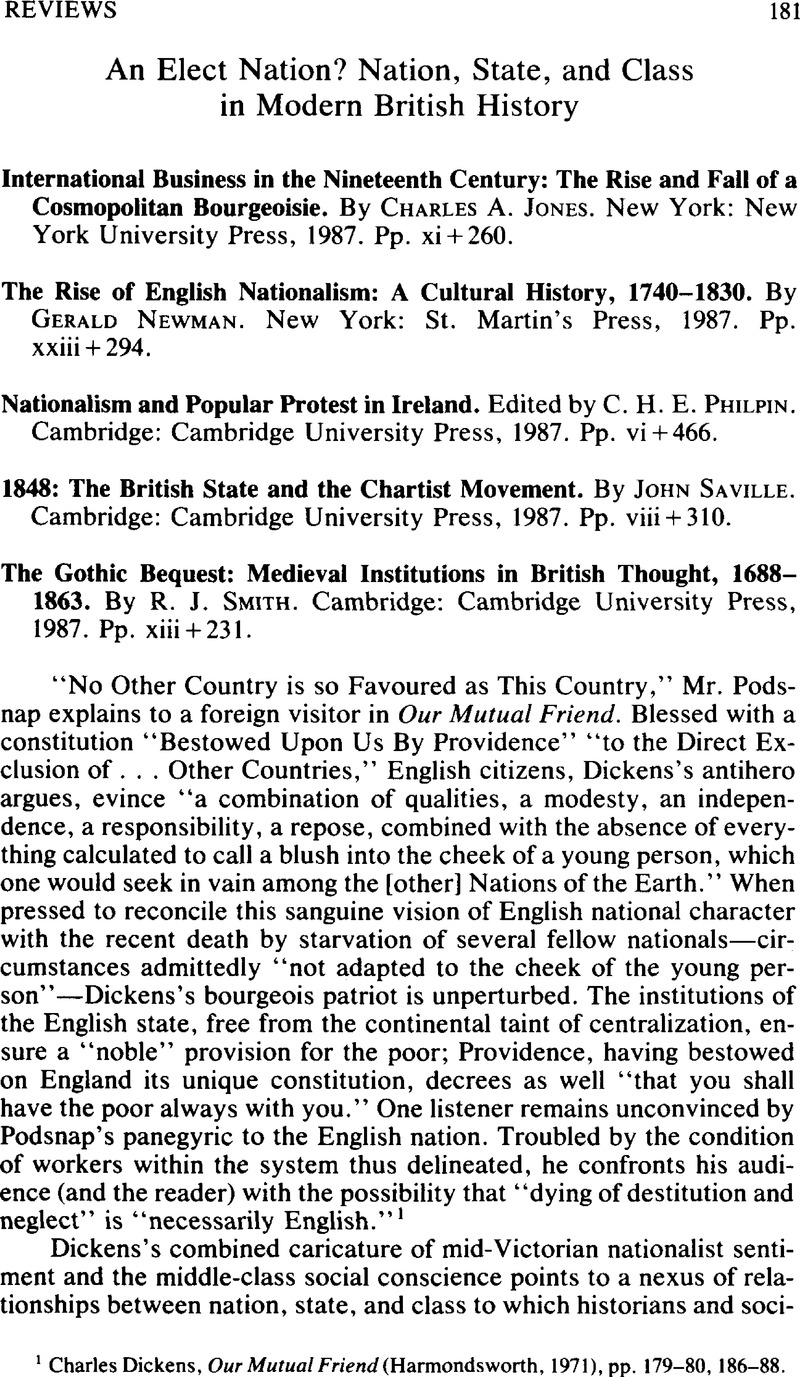Article contents
An Elect Nation? Nation, State, and Class in Modern British History - International Business in the Nineteenth Century: The Rise and Fall of a Cosmopolitan Bourgeoisie. By Charles A. Jones. New York: New York University Press, 1987. Pp. xi + 260. - The Rise of English Nationalism: A Cultural History, 1740–1830. By Gerald Newman. New York: St. Martin's Press, 1987. Pp. xxiii + 294. - Nationalism and Popular Protest in Ireland. Edited by C. H. E. Philpin. Cambridge: Cambridge University Press, 1987. Pp. vi + 466. - 1848: The British State and the Chartist Movement. By John Saville. Cambridge: Cambridge University Press, 1987. Pp. viii + 310. - The Gothic Bequest: Medieval Institutions in British Thought, 1688–1863. By R. J. Smith. Cambridge: Cambridge University Press, 1987. Pp. xiii + 231.
Review products
Published online by Cambridge University Press: 10 January 2014
Abstract

- Type
- Reviews
- Information
- Copyright
- Copyright © North American Conference of British Studies 1989
References
1 Dickens, Charles, Our Mutual Friend (Harmondsworth, 1971), pp. 179–80, 186–88Google Scholar.
2 Examples of the older perspective include Nationalism: A Report by a Study Group of Members of the Royal Institute of International Affairs (London, 1939)Google Scholar and Hayes, Carlton J. H., The Historical Development of Modern Nationalism (New York, 1931)Google Scholar. More recent approaches are found in Gellner, Ernest, Nations and Nationalism (Ithaca, N.Y., 1983)Google Scholar, and Smith, Anthony D., The Ethnic Origins of Nations (Oxford, 1987)Google Scholar.
3 For a sustained diatribe against the decline of class analysis, see Wood, Ellen Meiksins, The Retreat from Class: A New “True” Socialism (London, 1986)Google Scholar. Eric Hobsbawm, however, recognizes the need to augment class analysis with an understanding of the force of nationalism, arguing that “working-class consciousness … co-exists with other forms of collective identification and neither eliminates or replaces them.” See his “What Is the Workers' Country?” in Worlds of Labour: Further Studies in the History of Labour (London, 1984), pp. 49–65, 63Google Scholar.
4 Kohn, Hans, “The Genesis and Character of English Nationalism,” Journal of the History of Ideas 1 (January 1940): 69–94CrossRefGoogle Scholar; Furniss, Edgar, The Position of the Laborer in a System of Nationalism: A Study in the Labor Theories of the Later English Mercantilists (Boston, 1920)Google Scholar.
5 Best, Geoffrey, Honour among Men and Nations: Transformations of an Idea (Toronto, 1982), p. 12CrossRefGoogle Scholar; Seton-Watson, Hugh, Nations and States: An Enquiry into the Origins of Nations and the Politics of Nationalism (London, 1977), p. 34Google Scholar; Breuilly, John, Nationalism and the State (Manchester, 1982), pp. 53–57Google Scholar.
6 Zagorin, Perez, The Court and the Country: The Beginning of the English Revolution (London, 1969), esp. pp. 38–39, 72Google Scholar.
7 Hill, Christopher, Reformation to Industrial Revolution: A Social and Economic History (London, 1967), pp. 23Google Scholar (citing Namier), 21; O'Brien, Conor Cruise, God Land: Reflections on Religion and Nationalism (Cambridge, Mass., 1987), p. 27Google Scholar.
8 Elton, G. R., “English National Selfconsciousness and the Parliament in the Sixteenth Century” in Nationalismus in vorindustrieller Zeit, ed. Dann, Otto (Munich, 1986), pp. 73–82Google Scholar, 75; Corrigan, Philip and Sayer, Derek, The Great Arch: English State Formation and Cultural Revolution (Oxford, 1986), pp. 55–71Google Scholar.
9 Hroch, Miroslav, Social Preconditions of National Revival in Europe: A Comparative Analysis of the Social Composition of Patriotic Groups among the Smaller European Nations, trans. Fowkes, Ben (Cambridge, 1985), pp. 133–35Google Scholar.
10 Meinecke, Friedrich, Cosmopolitanism and the Nation State, trans. Kimber, Robert B. (Princeton, N.J., 1970)Google Scholar.
11 Hay, Douglas, “Property, Authority and the Criminal Law,” in Albion's Fatal Tree: Crime and Society in Eighteenth-Century England, ed. Hay, Douglaset al. (London, 1975), pp. 17–63Google Scholar.
12 Pocock, J. G. A., “The Limits and Divisions of British History: In Search of the Unknown Subject,” American Historical Review 87 (April 1982): 311–36, 320CrossRefGoogle Scholar.
13 Dickens (n. 1 above), p. 887.
- 1
- Cited by


